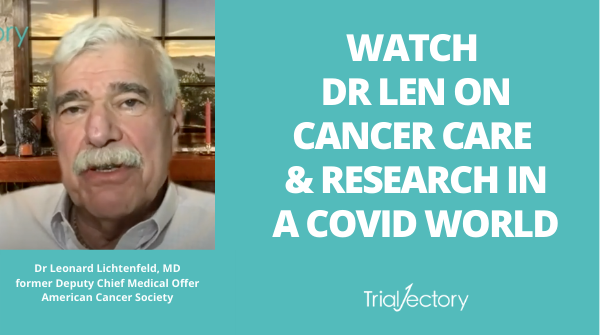Posted 11/18/2020
Dr. Leonard Lichtenfeld is a board-certified medical oncologist and internist who was a practicing physician for over 19 years and served as the Deputy Chief Medical Officer for the […]
Dr. Leonard Lichtenfeld is a board-certified medical oncologist and internist who was a practicing physician for over 19 years and served as the Deputy Chief Medical Officer for the American Cancer Society at its Global Headquarters in Atlanta. He has long been engaged in health care policy on a local, state, and national level. We recently welcomed Dr Len to TrialJectory as a member of our board of advisors.
During this talk, Dr. Len spoke about the widespread effects COVID has had not only on the general population but specifically on cancer patients. Cancer patients who had to visit hospitals for the disease or their treatment often arrived hospitals testing negative and left testing positive for COVID. As cases escalated, cancer patients had to be increasingly cautious as they are at greater risk of dying or having serious complications from the virus.
Evaluating risk vs. benefit
Visiting hospitals and testing sites put cancer patients at a higher risk of getting infected with COVID. Doctors began to make different recommendations on screening and treatment on a case-by-case basis.
Dr. Len described his decision to recommend people with average risk of cancer to delay screening. Because there would be a low chance of them having cancer, these patients would benefit more by waiting to get screened rather than put themselves at risk of getting COVID unnecessarily.
Different organizations are making recommendations for treating patients effectively without surgery to decrease their risk of getting COVID. These treatments include chemotherapy and different hormone treatments.
Long-term effects of COVID
Although delaying cancer screening made sense in the short-term, it created significant delays that may prevent doctors from diagnosing patients with cancer early enough to treat it effectively. Dr. Ben Sharp, the director of the National Cancer Institute, used data and modeling to predict that there is an estimated increase of 10,000 deaths because of these delays and the problems with continuing treatments and doctor’s visits that have occurred as a result of COVID.
Flu season during COVID
Because of social distancing and other COVID safety measures, Dr. Len suspects the flu will be less problematic this year. However, when someone gets sick this winter, they will wonder whether they have COVID or the flu. Sick individuals may not know how to proceed or which tests to get done in this case.
For this reason, Dr. Len suggests that anyone who is able to get a flu shot should get one this year and do so as early as possible. This is especially true for people around those with cancer, as having a community of safety surrounding these patients is extremely important.
COVID’s impact on research
Research has been progressing rapidly in recent years, but COVID has significantly impacted clinical research.
Many clinical trials had to be shut down, particularly those that required new drugs. Researchers and pharmaceutical companies have come together to try to work around the pandemic to make sure people can get their drugs. For instance, researchers are looking for ways to get drugs to patients who can no longer travel to get to their clinical trials.
Another problem with clinical trials is that there are lab tests and radiology studies that must be done. Researchers prefer to do these tests at the main research center, but they can now do them at local institutions. This allows the studies to continue running but introduces questions of the quality and consistency of the results.
Where are we today?
Dr. Len says that today, we are doing better than 7 months ago, but we are not at a perfect place. There is a lot of uncertainty surrounding the virus and what will happen in the coming weeks, especially with the predicted third wave approaching. COVID is here to stay for at least a little while, so everyone has to make adjustments in their everyday lives and learn to live with it.
There will eventually be a vaccine, but that will not happen tomorrow and even then it will not mark the end of the virus. Everyone must take precautions until then, and cancer patients must be especially cautious.
Making modifications to daily life
When entering a store, restaurant, doctor’s office, or any other enclosed space, Dr. Len suggests to be aware of how safe that place is. This includes making sure seats are far enough apart, people are staying distanced, hand sanitizer is available, there is outdoor seating, people are wearing their masks, there is plexiglass between customers and workers when possible, and more.
Hear more from Dr Len at Dr Len’s Blog: Expert perspective, insight, and discussion.
